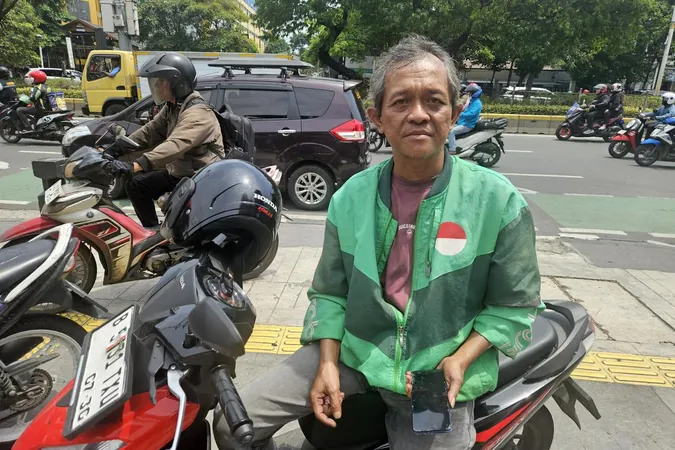
United in Green: The Rise of Ojol Riders in Jakarta's Protests
2025-09-04
Author: Rajesh
JAKARTA – As the sun rises over Jakarta, Mr. Aris Prabowo is already revving up his red Honda motorbike. Clad in a green jacket and strapped into a black helmet, he’s one of the countless ojol riders—motorcycle taxi drivers—helping to navigate the morning rush in a city of 11 million.
At 51, Mr. Aris' routine is relentless. He starts his day at 5:30 AM, working tirelessly until noon before heading home to care for his 17-year-old son with autism. His evenings are filled with delivering meals and passengers until nearly midnight, all the while cherishing the opportunity to balance work and family.
Like him, many ojol riders have tales of sacrifice and persistence. These drivers are the bustling lifeblood of Jakarta, fluent in navigating the city’s notorious traffic. Most operate under two primary platforms—Gojek and Grab—key players in Indonesia's burgeoning gig economy.
Tragedy struck recently when 21-year-old driver Affan Kurniawan lost his life under a police vehicle in an incident that triggered widespread protests. His death cut deep, rallying ojol drivers in a powerful display of unity against perceived injustices.
A decade earlier, Mr. Aris was entrenched in the corporate world, clocking in lengthy office hours which clashed with his family responsibilities. The strain led him to leave behind a steady paycheck in search of flexibility and a path to support his family.
Mr. Abdul Rochman, 29, also made a leap into this gig. Previously a sales supervisor, he traded a desk for freedom on the road. Though the job demands as many as 15 hours a day in scorching heat and downpours, he finds camaraderie among a diverse group of riders.
Days spent together on the roads cultivate bonds; they are often found congregating at roadside warungs, sharing meals and stories, no matter the generation gap.
However, the embrace of this lifestyle is not always by choice. Mr. Ari Kurniawan, 30, faced an abrupt career change when hackers wiped out his business. Seeking to provide for his wife and toddler, he joined the ranks of ojol drivers, struggling with fluctuating earnings.
With trips averaging around 10,000 rupiah each, a good day might net him 100,000 rupiah after covering expenses. Yet on tough days, he barely scrapes by.
The protests, sparked by economic discontent and a growing disillusionment with the governing elite, saw many ojol drivers voicing their frustrations. These demonstrations became crucial as inflation-related issues and rising taxes began to pinch household budgets.
But the heart of the protests was Affan's tragic death. His funeral drew massive crowds of fellow riders, including Mr. Ari, who passionately joined demonstrations at pivotal government sites. What emerged was not only grief but an unprecedented solidarity among the riders.
As protests surged, the challenges also mounted—blocked routes hampered their deliveries, and tensions rose during confrontations. Yet, surprising acts of support poured in from the public, who sent food through delivery apps to sustain these riders amid turmoil.
In a remarkable show of unity, the online movement "Brave Pink, Hero Green" emerged, symbolizing the struggle and honoring the everyday heroes of Indonesia. Profile pictures across social media morphed into flags of solidarity as both students and influencers joined the cause, fueling awareness.
—this digital chorus reflected their journey, encapsulating the grit of ojol drivers not just as delivery riders but as vital contributors in turbulent times. As Mr. Rizky—a fellow driver—expressed, "When strangers started sending us meals, it felt like finally, someone recognized our efforts beyond mere deliveries."



 Brasil (PT)
Brasil (PT)
 Canada (EN)
Canada (EN)
 Chile (ES)
Chile (ES)
 Česko (CS)
Česko (CS)
 대한민국 (KO)
대한민국 (KO)
 España (ES)
España (ES)
 France (FR)
France (FR)
 Hong Kong (EN)
Hong Kong (EN)
 Italia (IT)
Italia (IT)
 日本 (JA)
日本 (JA)
 Magyarország (HU)
Magyarország (HU)
 Norge (NO)
Norge (NO)
 Polska (PL)
Polska (PL)
 Schweiz (DE)
Schweiz (DE)
 Singapore (EN)
Singapore (EN)
 Sverige (SV)
Sverige (SV)
 Suomi (FI)
Suomi (FI)
 Türkiye (TR)
Türkiye (TR)
 الإمارات العربية المتحدة (AR)
الإمارات العربية المتحدة (AR)